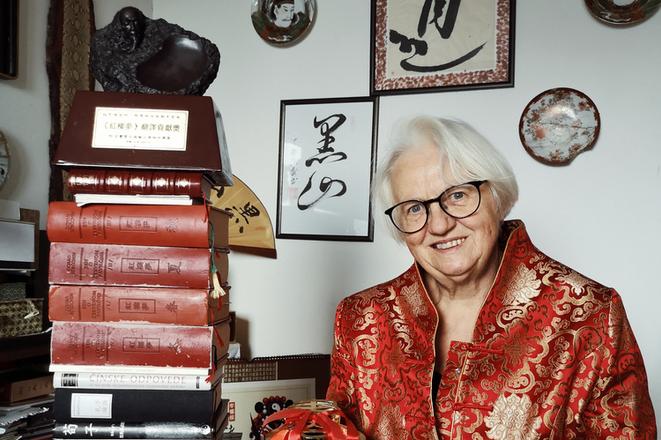When 17-year-old Marina Čarnogurská, having finished as a top student at one of the best schools in Bratislava in 1957, was told that she was not allowed to go to university, she burst into tears.
Her dream had been to study Bengali, but her father Pavol’s opposition to the communist regime in power meant she was denied the chance to further her education.
More than six decades later, she says is grateful for what happened then.
“What would I do with Bengali? Moreover, I would never have got to study Chinese,” the prominent Slovak sinologist, 81, says.
The ban on going to university was far from the only painful twist in her life, but looking back as she speaks to The Slovak Spectator at her home in Bratislava, she describes everything that has happened to her as being a single stream of energy guiding her to become a successful sinologist, a translator of Chinese philosophy and fiction, a writer of scientific works, and bringing about a meeting with her second husband.
“Everything in my life has had a purpose,” she says.
Marina Čarnogurská
born June 11, 1940
graduated in 1969-70 from Charles University in Prague (Chinese and philosophy)
1970-1973 – taught Chinese at Comenius University, Bratislava
1973-1990 – worked at the Alfa publishing warehouse
1977 – first publication of her work - translation from classical Chinese, The Master Said …
1990 – admitted as a scientist to the Slovak Academy of Sciences, Institute of Oriental Studies
1991 – doctoral thesis accepted 20 years after it was rejected by the communist regime
1993 – won a three-year grant of the Chiang Ching-kuo Foundation for International Scholarly Exchange in Taiwan
1997 – first visit to China
2001-2003 – publication of four volumes of her translation of the Dream of the Red Chamber, a novel by Cao Xueqin
2005 - in cooperation with the Czech philosopher Egon Bondy, she published the third version of their translations of Laozi’s Dao De jing
2009-2013 – publication of the two-volume sinologic book Laozi and the Process of the Creation of Dao De jing
2015 – given The Special Book Award in China for her contribution to spreading Chinese culture globally. The Slovak Academy of Science awarded her the Ľudovít Štúr gold medal in recognition of her achievements in social sciences
2017 – in cooperation with photographer and writer Peter Čaplický, she published the book: Mingovia (The history of the top Chinese dynasty Ming.)
2019 – completed the translation of the poetry work of the classic great Chinese female poet Cai Wenji in the book Embraced by the Desert
2021 – published the first translation anywhere of the “Heshang Gong Version” of Laozi’s Dao De jing
Her works include more than 340 books, scholarly research studies, monographs, translations, journals, and articles. She has also made numerous broadcast appearances.
Catholic background
Čarnogurská was the third child of five born to a Catholic family. Her father came from Zamagurie, a region in northern Slovakia, and her mother was born into a prominent wine-making family in Vajnory, now part of Bratislava.
She, her siblings, and parents were devout in their faith, but as Čarnogurská grew older, she began to drift away from the Catholic Church, as a strong sense of critical thinking developed in her.
“In real life, it doesn’t work that when you pray, everything is great,” she says.
Studying Chinese
After graduating from school, she got a job at a dry-cleaner but left a week later after being forced to pay for damage to an expensive dress that had been stained at her work with Chinese ink. Soon after, she got a job as an orthodontist’s assistant, which led to part-time study at medical school. In turn, this led to her finding work as a school nurse – a job which gave her enough time to sign up for English, and then Chinese, studies at a local state language school.
Čarnogurská recalls that when she was young, she had considered Chinese too complicated a language and was daunted by its tens of thousands of characters. But she began to study it because it was a relatively exotic language at the time that few people paid attention to, and she was inspired by what proving she could master such a difficult language might do for her as she tried to come to terms with being banned from going to university.
“I needed a boost to my self-confidence,” she says.
While she was completing the six-year language course she repeatedly applied to universities for various studies – contacting the Academy of Performing Arts, and other universities in Bratislava – but was always turned down because of her father’s political stance.
Then, in 1963, she tried her luck in Prague, and to her surprise was one of only three young people accepted to study Chinese at Charles University.
One year into her course she dropped her minor subject, English, and took up philosophy instead. Her studies focused on classical Chinese, which, she explains, differs from the modern spoken form of Chinese in the same way that Latin differs from modern Italian.
She completed her studies in 1969.
“I was lucky that I studied during the years when the communist regime was not as strict, between 1963 and 1969,” Čarnogurská says.


 Marina Čarnogurská sitting next to the pile of her published works. (source: Jana Gombošová)
Marina Čarnogurská sitting next to the pile of her published works. (source: Jana Gombošová)